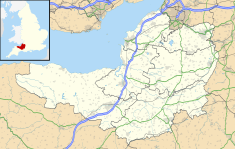
Summary
The Corn Exchange is a commercial building in Cornhill, Bridgwater, Somerset, England. The structure, which is now used as a chain restaurant, is a Grade I listed building.[1]
| Corn Exchange, Bridgwater | |
|---|---|
 Corn Exchange, Bridgewater | |
| Location | Cornhill, Bridgwater |
| Coordinates | 51°07′42″N 3°00′15″W / 51.1283°N 3.0041°W |
| Built | 1834 |
| Architect | John Bowen |
| Architectural style(s) | Neoclassical style |
Listed Building – Grade I | |
| Official name | Corn Exchange and attached railings, market House and attached railings |
| Designated | 24 March 1950 |
| Reference no. | 1205740 |
 Shown in Somerset | |
History edit
As early as the 14th century, there was a shambles for the sale of farm products on Cornhill.[2] In the late 18th century, local merchants decided to commission a purpose-built "corn market": this was a rectangular structure built in brick and completed in 1791.[3]
After the north and south sides of the corn market were demolished to facilitate road widening in 1825, the building was remodelled, to a design by John Bowen in the neoclassical style, and encased in ashlar stone in 1834.[4] The design involved a symmetrical main frontage of three bays onto Cornhill. The central bay featured a prominent circular portico formed by a colonnade of Ionic order columns supporting an entablature, a cornice, and a parapet. The portico was surmounted by a drum-shaped structure, with panels decorated by paterae, topped by a dome, a hexagonal roof lantern and a finial. The finial incorporated a finely carved pineapple in its design.[5] The outer bays, which were slightly projected forward, contained openings flanked by Ionic order columns in antis supporting an entablature and a parapet.[1] The architectural historian, Nikolaus Pevsner, was impressed with the design which he described as "just right in scale and modest formality for a county town of some pride and traditions".[6]
The market hall behind was extended to the west, to a design by Charles Knowles, in 1875.[7][8] Railings, which originally surrounded the building to separate the livestock from the food produce, were removed in 1895.[9] A statue of the 17th-century naval commander Robert Blake, who was born in the town, was designed by F. W. Pomeroy and installed in front of the building in 1898.[10] However, the use of the building as a corn exchange declined significantly in the wake of the Great Depression of British Agriculture in the late 19th century.[11]
A major programme of refurbishment works, which allowed additional retail units to be introduced into the complex, was completed in 1985,[2] and the statue of Blake was moved further to the east, as part of a pedestrianisation scheme, at that time.[12] A chain restaurant was established in the building in the early 21st century.[13]
See also edit
References edit
- ^ a b Historic England. "Corn Exchange and attached railings, market House and attached railings (1205740)". National Heritage List for England. Retrieved 25 June 2023.
- ^ a b Cleaver, Lynne (2022). A-Z of Bridgwater Places-People-History. Amberley Publishing. ISBN 978-1445697895.
- ^ Lambert, Tim (14 March 2021). "Bridgwater". Local Histories. Retrieved 16 April 2023.
- ^ Dunning, Robert; Elrington, C. R.; Baggs, A. P.; Siraut, M. C. (1992). "Bridgwater: Economic history". Volume 6: Andersfield, Cannington, and North Petherton Hundreds (Bridgwater and neighbouring parishes). British History Online. Retrieved 16 June 2023.
- ^ "We explore Bridgwater and find out why it really is great". Somerset Live. 18 June 2022. Retrieved 25 June 2023.
- ^ Pevsner, Nikolaus (2001). South and West Somerset (Buildings of England Series). Yale University Press. p. 98. ISBN 978-0300096446.
- ^ Gathercole, Clare. "Bridgwater Archaeological Assessment" (PDF). Somerset Extensive Urban Survey. Somerset County Council. p. 18. Retrieved 16 April 2023.
- ^ "Bridgwater". Visitor UK. Retrieved 25 June 2023.
- ^ "The Cornhill". Bridgwater Somerset. Archived from the original on 16 December 2010. Retrieved 16 April 2023.
- ^ Historic England. "Blake statue (1205747)". National Heritage List for England. Retrieved 16 April 2023.
- ^ Fletcher, T. W. (1973). 'The Great Depression of English Agriculture 1873-1896' in British Agriculture 1875-1914. London: Methuen. p. 31. ISBN 978-1136581182.
- ^ "Those Were The Days: Bridgwater in 1985, 1995 and 2005". Bridgwater Mercury. 3 March 2010. Retrieved 25 June 2023.
- ^ "Bridgwater". Prezzo. Retrieved 1 October 2023.


